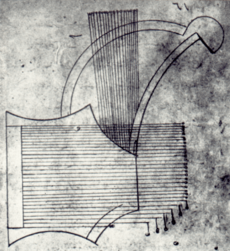- This page was last modified on 17 October 2025, at 10:18. Suggest an edit.
al-Farabi facts for kids
|
al-Fārābī
|
|
|---|---|
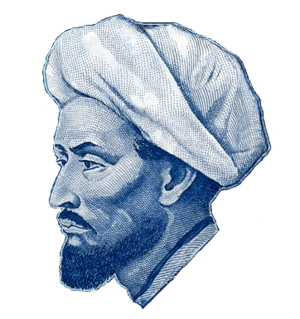
Portrait of al-Farabi in profile
|
|
| Born | c. 870 |
| Died | c. 950 (aged around 80) |
| Other names | The Second Teacher |
|
Notable work
|
kitāb al-mūsīqī al-kabīr ("Grand Book of Music"), ārā ahl al-madīna al-fāḍila ("The Virtuous City"), kitāb iḥṣāʾ al-ʿulūm ("Enumeration of the Sciences"), kitāb iḥṣāʾ al-īqā'āt ("Classification of Rhythms") |
| Era | Islamic Golden Age |
| Region | Islamic philosophy |
| School | Aristotelianism, Neoplatonism, idealism |
|
Main interests
|
Metaphysics, political philosophy, law, logic, music, science, ethics, mysticism, epistemology |
|
Influenced
|
|
Abū Naṣr Muḥammad al-Fārābī (Arabic: أبو نصر محمد الفارابي), known in the West as Alpharabius, was a very important early Islamic philosopher and jurist. He lived from about 870 to 950 or 951 AD. He wrote many books about political philosophy, metaphysics, ethics, and logic. He was also a scientist, cosmologist, mathematician, music theorist, and doctor.
In Islamic philosophy, people often called him "the Second Teacher." This was because Aristotle was known as "the First Teacher." Al-Farabi helped save many original Greek texts during the Middle Ages. He did this by writing comments and treatises about them. He also influenced many famous thinkers like Avicenna and Maimonides. His work became well-known in both the West and East.
Biography
Not much is known for sure about al-Farabi's early life. What we know comes from stories and guesses made long after he lived. He spent most of his life in Baghdad. There, he studied with Christian scholars like Yuhanna ibn Haylan.
Later, he lived in Damascus and Egypt. He then returned to Damascus, where he passed away in 950 or 951 AD. His full name was Abū Naṣr Muḥammad ibn Muḥammad al-Fārābī.
His birthplace might have been in Central Asia, which was then called Khurasan. The name "Farab" means a place watered by springs or rivers. There are many places with similar names in that area. For example, Farab in modern Kazakhstan, or Faryab in modern Afghanistan.
Background
Scholars are not completely sure about al-Farabi's family background. Some say he was of Persian origin, while others say he was Turkic. An early biographer, Ibn Abi Usaibia, said al-Farabi's father was Persian. Other sources also suggest he was Persian. Some scholars point out that his writings include words from Persian, Sogdian, and Greek, but not Turkish.
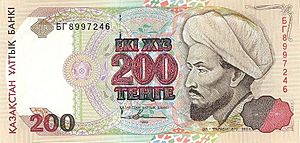
al-Farabi on the currency of the Republic of Kazakhstan
However, a later historian, Ibn Khallikan, said al-Farabi was born in a village near Farab in Kazakhstan to Turkic parents. This led some to believe he was Turkic. Today, many scholars still debate his exact background.
Life and Education
Al-Farabi spent most of his life in Baghdad. He studied logic, medicine, and sociology with Yuhanna bin Haylan. This teacher was a Christian cleric. Al-Farabi learned about important works by Aristotle and Porphyry.
He was in Baghdad until at least 942 AD. He then moved to Damascus and finished one of his famous books there. He also visited Egypt and taught in Aleppo. He returned to Syria and was supported by Sayf al-Dawla, a ruler of the Hamdanid family. Al-Farabi died in Damascus in 950 or 951 AD.
Religious Beliefs
Al-Farabi's religious beliefs within Islam are debated. Some historians think he was Sunni, while others believe he was Shia or influenced by Shia ideas. Some scholars argue that his ideas about an ideal society, ruled by a prophet or his successors (like Imams), show Shiite influences.
Works and Contributions
Al-Farabi made many important contributions to different fields. These include logic, mathematics, music, philosophy, psychology, and education.
Alchemy
Al-Farabi wrote a book called The Necessity of the Art of the Elixir. This shows his interest in alchemy, which was an early form of chemistry.
Logic
Al-Farabi was mainly a logician who followed Aristotle's ideas. However, he also added his own thoughts. He talked about how logic and grammar are related. He also divided logic into two main parts: "idea" and "proof".
He also looked at ideas from the Stoic school of logic, like conditional syllogisms. He even added the idea of "poetic syllogism" in his comments on Aristotle's Poetics.
Music
Al-Farabi wrote a famous book about music called Kitab al-Musiqa al-Kabir (Grand Book of Music). In this book, he explained the deep ideas behind music. He also discussed how music has cosmic qualities and affects people.
He also wrote about the Meanings of the Intellect. This work talked about music therapy and how music can help the soul.
Philosophy
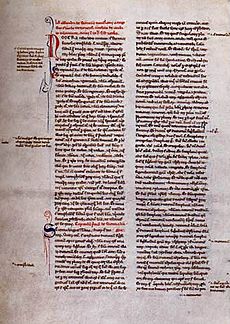
Gerard of Cremona's Latin translation of Kitab ihsa' al-'ulum ("Enumeration of the Sciences")
As a philosopher, al-Farabi started his own school of thought called "Farabism." He tried to combine different philosophical ideas. His ideas were very important for several centuries. People saw him as second only to Aristotle in knowledge. This is why he was called "the Second Teacher." His work also helped prepare the way for later philosophers like Avicenna.
One of his most famous books is Ara Ahl al-Madina al-Fadila (The Virtuous City). In this book, he described an ideal state, much like Plato's The Republic. Al-Farabi believed that religion helps explain truth using symbols. He thought it was the philosopher's job to guide the state.
He imagined an ideal state ruled by a Prophet-Imam, similar to Plato's philosopher-king. He saw the city-state of Medina under the prophet Muhammad as an example of this ideal. When there was no Prophet-Imam, al-Farabi thought democracy was the next best form of government.
Physics
Al-Farabi wrote a short book called "On Vacuum." In it, he thought about whether a perfect void could exist. He concluded that air can expand to fill any space. He suggested that the idea of a perfect vacuum didn't make sense.
Psychology
Al-Farabi wrote about social psychology in his works like Principles of the Opinions of the Citizens of the Virtuous City. He believed that people cannot achieve everything alone. They need to work with others. He said it's natural for humans to join with others to get things done.
In his book On the Cause of Dreams, he looked at how dreams happen and what they mean.
Philosophical Thought
Al-Farabi's philosophy was mainly influenced by the ideas of Aristotle. He wrote over a hundred works, including comments on Aristotle's books. His ideas were very organized, even though he combined many different philosophical traditions. Other important influences on his work were Ptolemy's model of the planets and parts of Neo-Platonism.
Al-Farabi had a big impact on Maimonides, an important Jewish thinker. Maimonides' work on logic was influenced by al-Farabi's ideas. Al-Farabi also tried to bring together the ideas of Plato and Aristotle in his book "The gathering of the ideas of the two philosophers."
Metaphysics and Cosmology
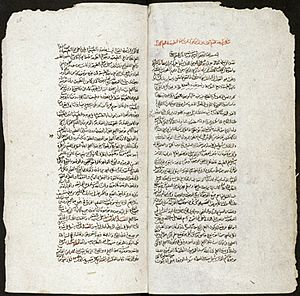
Pages from a 17th-century manuscript of al-Farabi's commentary on Aristotle's metaphysics
Al-Farabi believed that metaphysics is mainly about "being itself." This means understanding what existence is. He thought that God is related to this because God is the source of all being.
His ideas about the universe combine Aristotle's ideas about causes, Plotinus's ideas about things flowing out from a source (emanation), and Ptolemy's astronomy. In his model, the universe is like a set of circles, one inside the other. The outermost circle is the "first heaven," then the fixed stars, then planets like Saturn, Jupiter, Mars, the Sun, Venus, Mercury, and finally the Moon. At the center is our material world.
Each circle represents a "secondary intelligence" (like the celestial bodies). These intelligences act as links between the First Cause (God) and our world. They are said to have "flowed out" from God.
This process of emanation starts with the First Cause, which thinks about itself. This thinking causes the next intelligence to "flow out." Each intelligence then thinks about itself and the one before it, creating more levels. This continues until the tenth intelligence, below which is our material world. Each level becomes more complex. Al-Farabi believed this process happens out of necessity, not choice. This means the universe is eternal.
When talking about the First Cause (God), al-Farabi said we cannot fully understand God using our minds. This is because God is uncaused and unique. The more simple something is, the more perfect it is. Our material world is the most complex and least perfect.
Epistemology and Eschatology
Human beings are special in al-Farabi's view. We are between two worlds: the "higher" world of pure intellects and the "lower" material world. We have a physical body, but also a rational mind that connects us to the "higher" world. Human perfection means constantly thinking and contemplating.
Al-Farabi divided the human mind (intellect) into four types:
- Potential Intellect: Our ability to think.
- Actual Intellect: When we are actively thinking.
- Acquired Intellect: When our mind has understood all universal truths.
- Agent Intellect: The tenth intelligence in his universe model, which helps us think.
To go from just being able to think (potential) to actually thinking (actual), the Agent Intellect helps us. It's like the sun lighting up the world so we can see. The Agent Intellect lights up ideas so we can understand them. When our mind understands all universal truths, it becomes connected to the Agent Intellect's perfection. This is called the acquired Intellect.
Al-Farabi believed that humans have free will. We choose whether to use our knowledge for good or bad actions. By choosing what is ethical and thinking about ethics, our mind can become more like the active intellect. This helps us reach perfection. Only through this process can a human soul survive after death.
Al-Farabi thought that after death, the soul's individual parts disappear. Only the rational part survives, if it has reached perfection. This surviving part joins with other rational souls in the agent intellect. It enters a world of pure intelligence.
Psychology, the Soul, and Prophetic Knowledge
Al-Farabi described the human soul as having four parts:
- Appetitive: Our desires or dislikes.
- Sensitive: Our ability to sense things with our five senses.
- Imaginative: Our ability to remember images, combine them, and create new ones.
- Rational: Our ability to think and reason. This part is unique to humans and is the only part that survives after the body dies.
Al-Farabi paid special attention to the soul's imaginative part. He said it can represent things using images that are not their own. For example, we might imagine "evil" as "darkness."
He believed that a Prophet has a very strong imaginative ability. This allows the Prophet to receive deep truths from the Agent Intellect. These truths are then turned into symbols and images by the Prophet's imagination. This helps ordinary people understand complex ideas. So, prophetic knowledge is special not because of its content, but because of how it is presented through imagination.
Practical Philosophy (Ethics and Politics)
Al-Farabi believed that philosophy should be used in real life. He thought philosophers who didn't use their knowledge for practical things were "futile." He said an ideal society aims for "true happiness," which means philosophical understanding. A good philosopher must be able to explain complex truths to everyone.
He compared the philosopher's role in society to a doctor's role for the body. Just as a doctor heals the body, a philosopher heals the souls of people. The philosopher's job is to create a "virtuous" society by establishing justice and guiding people towards "true happiness."
Al-Farabi knew that such an ideal society was rare. He divided "vicious" societies (those that are not ideal) into three types:
- Ignorant: Societies that don't understand the real purpose of human life. They chase things like wealth or power instead of true happiness.
- Wicked: Societies that know what is right but choose to do wrong.
- Errant: Societies that believe in wrong ideas or leaders.
He also mentioned "weeds" in a virtuous society. These are people who try to stop the society from reaching its goals. His book Ara Ahl al-Madina al-fadila (The Virtuous City) is the best source for his ideas on political philosophy.
Some scholars debate whether al-Farabi wanted to create a real political plan. Some think his ideas were more about spiritual philosophy. Others believe he was subtly showing that a single, perfect Islamic society was very difficult to achieve.
Legacy
- A large Kazakh university, KazNU, is named after him. There is also an Al-Farabi Library there.
- The Shymkent Pedagogical Institute of Culture was named after al-Farabi from 1967 to 1996.
- Many cities in Kazakhstan have streets named after him.
- Monuments have been built in the cities of Alma-Ata, Shymkent, and Turkestan.
- In 1975, the 1100th anniversary of al-Farabi's birth was celebrated internationally in Moscow, Alma-Ata, and Baghdad.
- The main-belt asteroid 7057 Al-Fārābī was named in his honor.
- In November 2021, a monument to al-Farabi was unveiled in Nur-Sultan, Kazakhstan.
See Also
 In Spanish: Al-Farabi para niños
In Spanish: Al-Farabi para niños
- List of modern-day Muslim scholars of Islam
- List of Muslim scientists
- Tenth Intellect in Ismailism


